Changing Nature and Perceptions of Child Care: Psychology
VerifiedAdded on 2022/08/12
|5
|1405
|18
Essay
AI Summary
This essay delves into the evolving landscape of child care, examining the challenges and changing perceptions surrounding children, particularly those with disabilities. It highlights the importance of community support, parental involvement, and the need to move beyond traditional medical models of disability towards a more inclusive approach. The essay emphasizes the impact of societal attitudes and barriers on children's development, stressing the significance of creating supportive environments that foster independence, acceptance, and opportunities for growth. It also explores the multifaceted factors that influence child development, including the role of friends, neighbors, and childcare providers, as well as the impact of community intervention and support. The essay also discusses the vulnerability of parents of disabled children and the need for adequate information and expert guidance to enhance parenting activities and promote positive outcomes for all children.
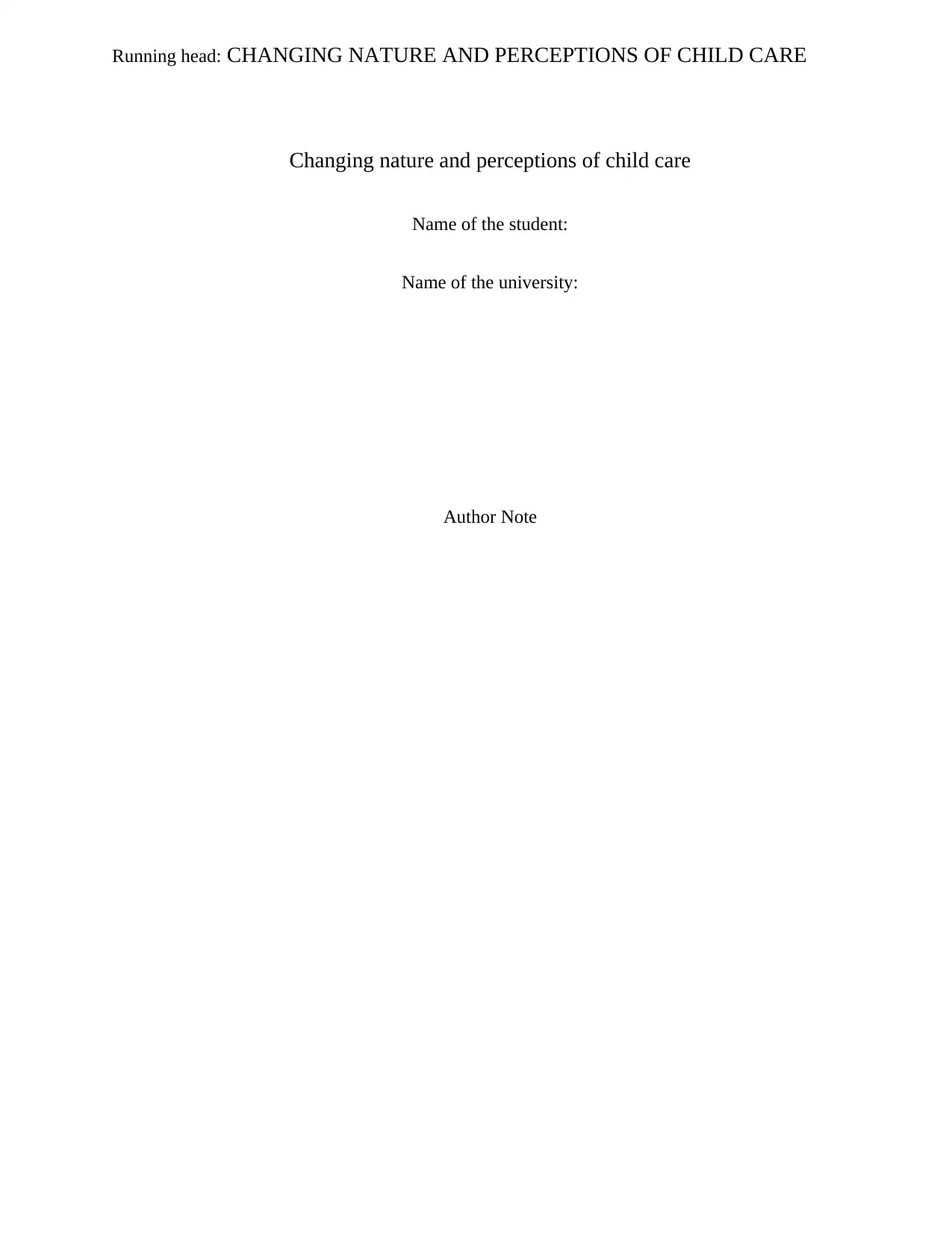
Running head: CHANGING NATURE AND PERCEPTIONS OF CHILD CARE
Changing nature and perceptions of child care
Name of the student:
Name of the university:
Author Note
Changing nature and perceptions of child care
Name of the student:
Name of the university:
Author Note
Paraphrase This Document
Need a fresh take? Get an instant paraphrase of this document with our AI Paraphraser
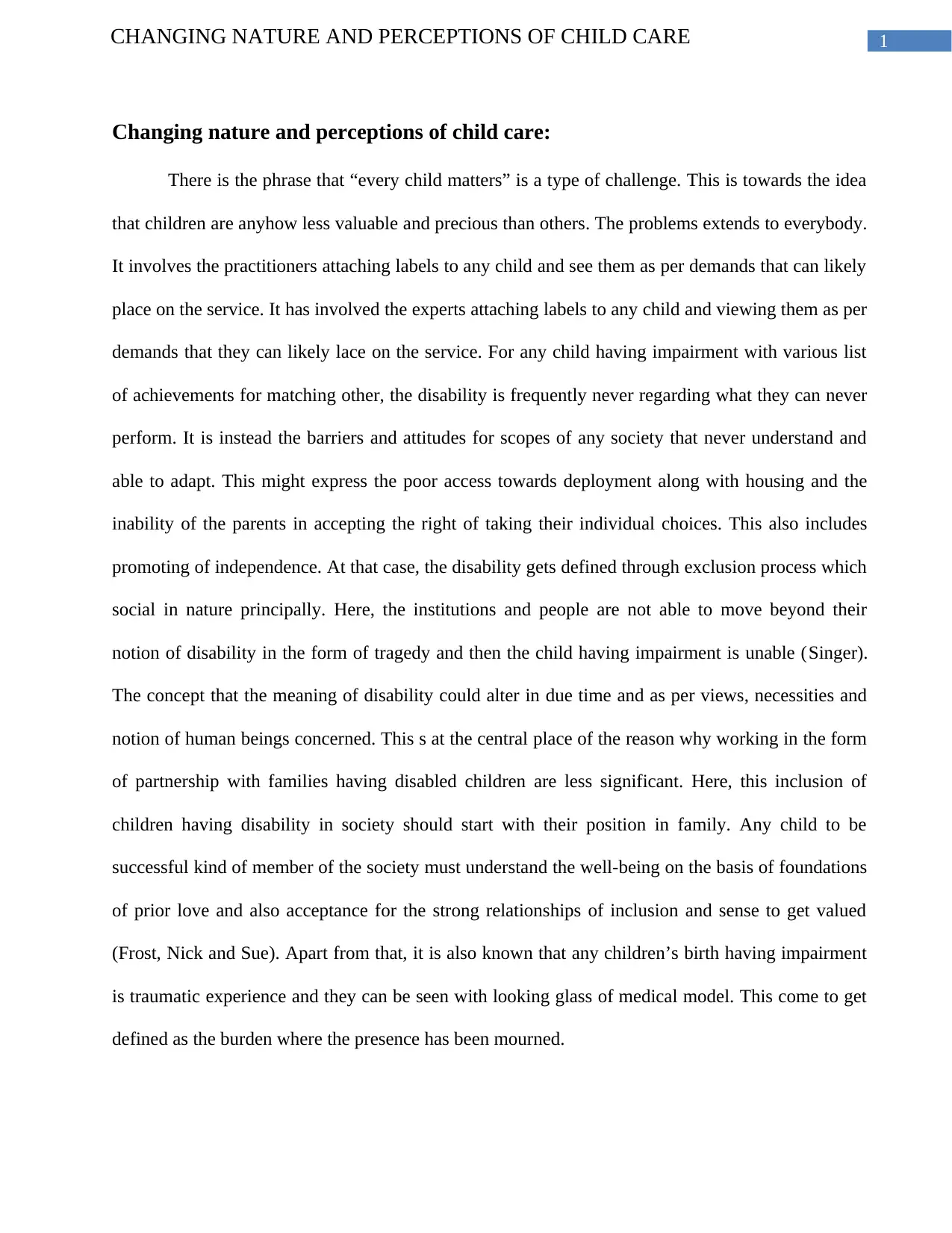
1CHANGING NATURE AND PERCEPTIONS OF CHILD CARE
Changing nature and perceptions of child care:
There is the phrase that “every child matters” is a type of challenge. This is towards the idea
that children are anyhow less valuable and precious than others. The problems extends to everybody.
It involves the practitioners attaching labels to any child and see them as per demands that can likely
place on the service. It has involved the experts attaching labels to any child and viewing them as per
demands that they can likely lace on the service. For any child having impairment with various list
of achievements for matching other, the disability is frequently never regarding what they can never
perform. It is instead the barriers and attitudes for scopes of any society that never understand and
able to adapt. This might express the poor access towards deployment along with housing and the
inability of the parents in accepting the right of taking their individual choices. This also includes
promoting of independence. At that case, the disability gets defined through exclusion process which
social in nature principally. Here, the institutions and people are not able to move beyond their
notion of disability in the form of tragedy and then the child having impairment is unable (Singer).
The concept that the meaning of disability could alter in due time and as per views, necessities and
notion of human beings concerned. This s at the central place of the reason why working in the form
of partnership with families having disabled children are less significant. Here, this inclusion of
children having disability in society should start with their position in family. Any child to be
successful kind of member of the society must understand the well-being on the basis of foundations
of prior love and also acceptance for the strong relationships of inclusion and sense to get valued
(Frost, Nick and Sue). Apart from that, it is also known that any children’s birth having impairment
is traumatic experience and they can be seen with looking glass of medical model. This come to get
defined as the burden where the presence has been mourned.
Changing nature and perceptions of child care:
There is the phrase that “every child matters” is a type of challenge. This is towards the idea
that children are anyhow less valuable and precious than others. The problems extends to everybody.
It involves the practitioners attaching labels to any child and see them as per demands that can likely
place on the service. It has involved the experts attaching labels to any child and viewing them as per
demands that they can likely lace on the service. For any child having impairment with various list
of achievements for matching other, the disability is frequently never regarding what they can never
perform. It is instead the barriers and attitudes for scopes of any society that never understand and
able to adapt. This might express the poor access towards deployment along with housing and the
inability of the parents in accepting the right of taking their individual choices. This also includes
promoting of independence. At that case, the disability gets defined through exclusion process which
social in nature principally. Here, the institutions and people are not able to move beyond their
notion of disability in the form of tragedy and then the child having impairment is unable (Singer).
The concept that the meaning of disability could alter in due time and as per views, necessities and
notion of human beings concerned. This s at the central place of the reason why working in the form
of partnership with families having disabled children are less significant. Here, this inclusion of
children having disability in society should start with their position in family. Any child to be
successful kind of member of the society must understand the well-being on the basis of foundations
of prior love and also acceptance for the strong relationships of inclusion and sense to get valued
(Frost, Nick and Sue). Apart from that, it is also known that any children’s birth having impairment
is traumatic experience and they can be seen with looking glass of medical model. This come to get
defined as the burden where the presence has been mourned.
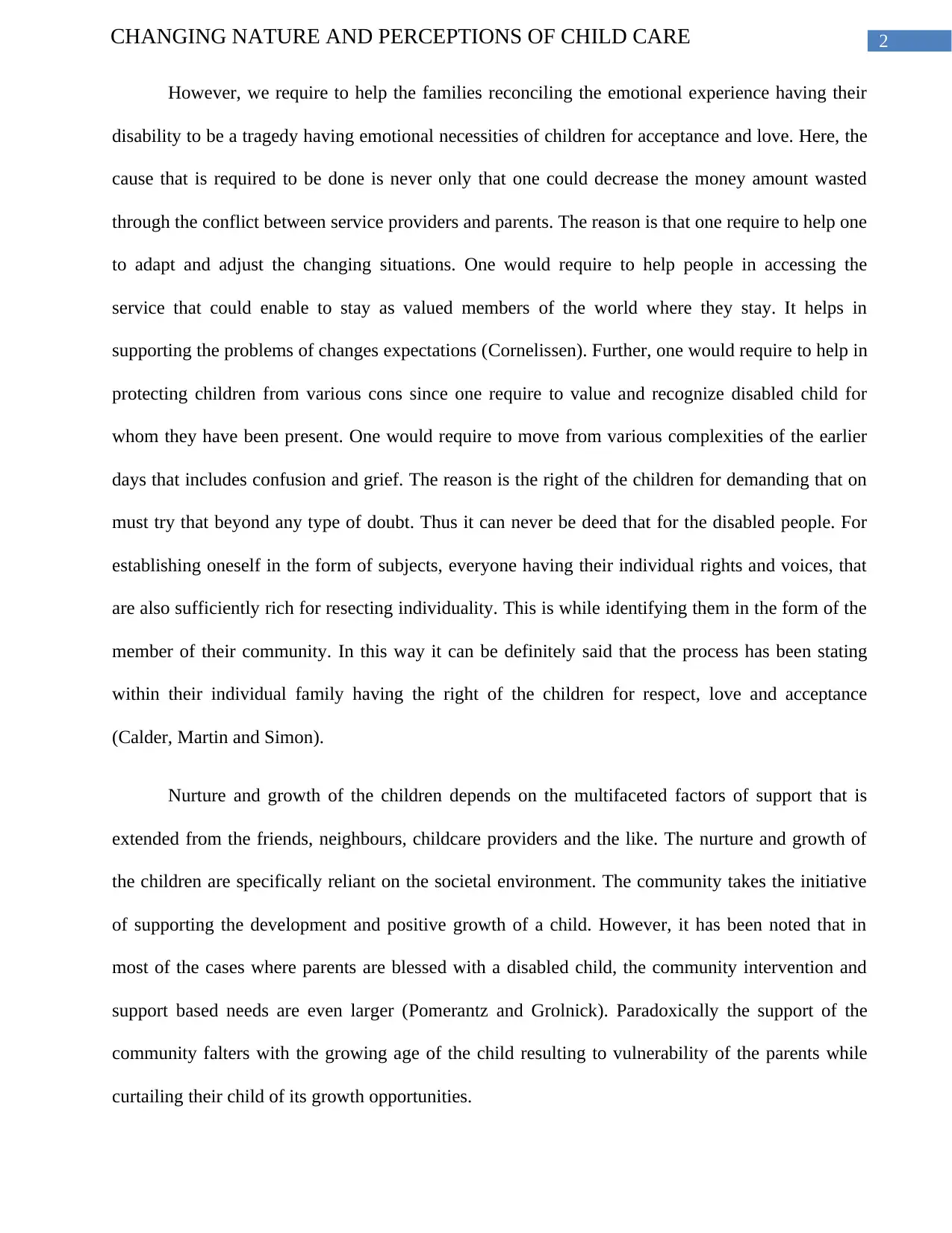
2CHANGING NATURE AND PERCEPTIONS OF CHILD CARE
However, we require to help the families reconciling the emotional experience having their
disability to be a tragedy having emotional necessities of children for acceptance and love. Here, the
cause that is required to be done is never only that one could decrease the money amount wasted
through the conflict between service providers and parents. The reason is that one require to help one
to adapt and adjust the changing situations. One would require to help people in accessing the
service that could enable to stay as valued members of the world where they stay. It helps in
supporting the problems of changes expectations (Cornelissen). Further, one would require to help in
protecting children from various cons since one require to value and recognize disabled child for
whom they have been present. One would require to move from various complexities of the earlier
days that includes confusion and grief. The reason is the right of the children for demanding that on
must try that beyond any type of doubt. Thus it can never be deed that for the disabled people. For
establishing oneself in the form of subjects, everyone having their individual rights and voices, that
are also sufficiently rich for resecting individuality. This is while identifying them in the form of the
member of their community. In this way it can be definitely said that the process has been stating
within their individual family having the right of the children for respect, love and acceptance
(Calder, Martin and Simon).
Nurture and growth of the children depends on the multifaceted factors of support that is
extended from the friends, neighbours, childcare providers and the like. The nurture and growth of
the children are specifically reliant on the societal environment. The community takes the initiative
of supporting the development and positive growth of a child. However, it has been noted that in
most of the cases where parents are blessed with a disabled child, the community intervention and
support based needs are even larger (Pomerantz and Grolnick). Paradoxically the support of the
community falters with the growing age of the child resulting to vulnerability of the parents while
curtailing their child of its growth opportunities.
However, we require to help the families reconciling the emotional experience having their
disability to be a tragedy having emotional necessities of children for acceptance and love. Here, the
cause that is required to be done is never only that one could decrease the money amount wasted
through the conflict between service providers and parents. The reason is that one require to help one
to adapt and adjust the changing situations. One would require to help people in accessing the
service that could enable to stay as valued members of the world where they stay. It helps in
supporting the problems of changes expectations (Cornelissen). Further, one would require to help in
protecting children from various cons since one require to value and recognize disabled child for
whom they have been present. One would require to move from various complexities of the earlier
days that includes confusion and grief. The reason is the right of the children for demanding that on
must try that beyond any type of doubt. Thus it can never be deed that for the disabled people. For
establishing oneself in the form of subjects, everyone having their individual rights and voices, that
are also sufficiently rich for resecting individuality. This is while identifying them in the form of the
member of their community. In this way it can be definitely said that the process has been stating
within their individual family having the right of the children for respect, love and acceptance
(Calder, Martin and Simon).
Nurture and growth of the children depends on the multifaceted factors of support that is
extended from the friends, neighbours, childcare providers and the like. The nurture and growth of
the children are specifically reliant on the societal environment. The community takes the initiative
of supporting the development and positive growth of a child. However, it has been noted that in
most of the cases where parents are blessed with a disabled child, the community intervention and
support based needs are even larger (Pomerantz and Grolnick). Paradoxically the support of the
community falters with the growing age of the child resulting to vulnerability of the parents while
curtailing their child of its growth opportunities.
⊘ This is a preview!⊘
Do you want full access?
Subscribe today to unlock all pages.

Trusted by 1+ million students worldwide
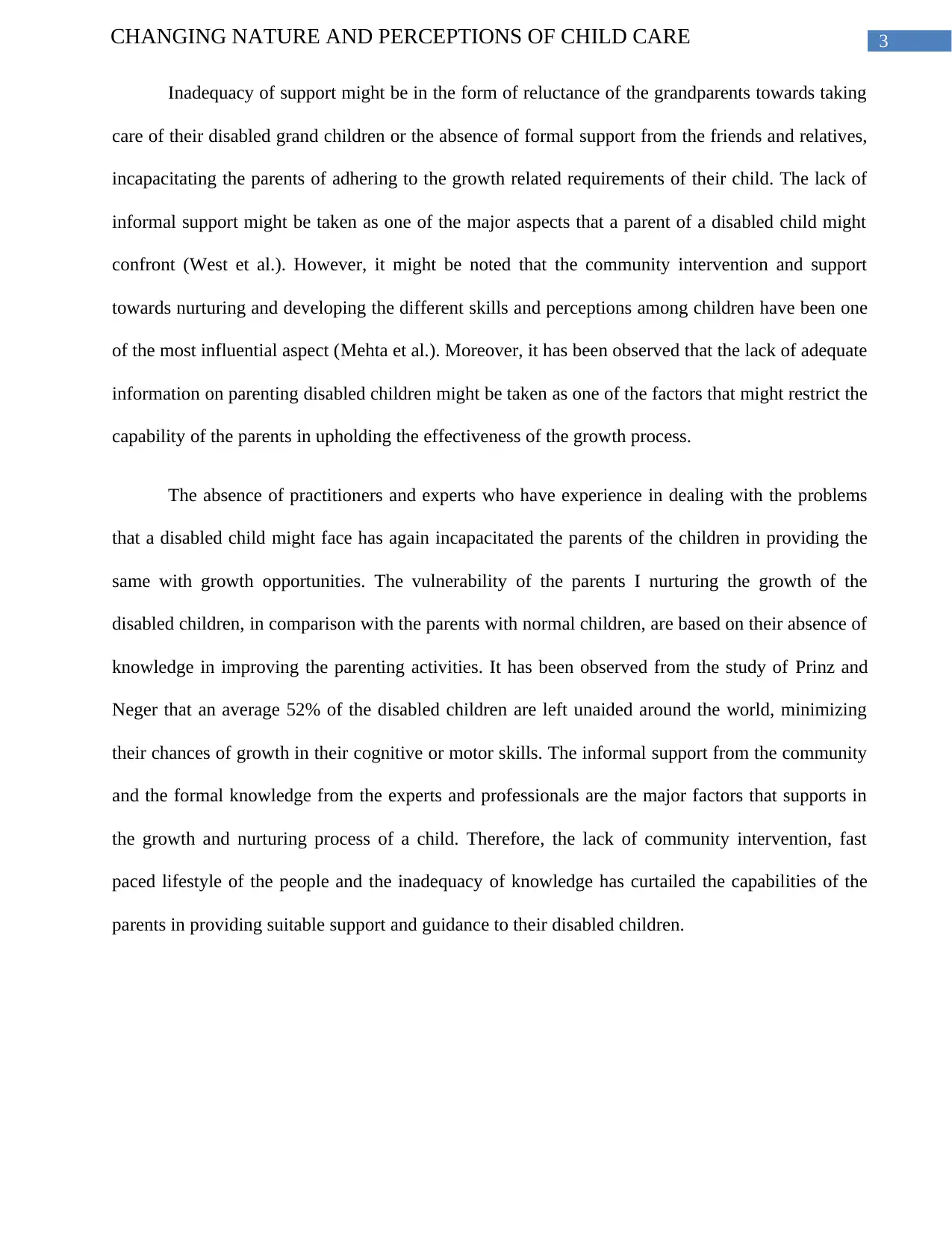
3CHANGING NATURE AND PERCEPTIONS OF CHILD CARE
Inadequacy of support might be in the form of reluctance of the grandparents towards taking
care of their disabled grand children or the absence of formal support from the friends and relatives,
incapacitating the parents of adhering to the growth related requirements of their child. The lack of
informal support might be taken as one of the major aspects that a parent of a disabled child might
confront (West et al.). However, it might be noted that the community intervention and support
towards nurturing and developing the different skills and perceptions among children have been one
of the most influential aspect (Mehta et al.). Moreover, it has been observed that the lack of adequate
information on parenting disabled children might be taken as one of the factors that might restrict the
capability of the parents in upholding the effectiveness of the growth process.
The absence of practitioners and experts who have experience in dealing with the problems
that a disabled child might face has again incapacitated the parents of the children in providing the
same with growth opportunities. The vulnerability of the parents I nurturing the growth of the
disabled children, in comparison with the parents with normal children, are based on their absence of
knowledge in improving the parenting activities. It has been observed from the study of Prinz and
Neger that an average 52% of the disabled children are left unaided around the world, minimizing
their chances of growth in their cognitive or motor skills. The informal support from the community
and the formal knowledge from the experts and professionals are the major factors that supports in
the growth and nurturing process of a child. Therefore, the lack of community intervention, fast
paced lifestyle of the people and the inadequacy of knowledge has curtailed the capabilities of the
parents in providing suitable support and guidance to their disabled children.
Inadequacy of support might be in the form of reluctance of the grandparents towards taking
care of their disabled grand children or the absence of formal support from the friends and relatives,
incapacitating the parents of adhering to the growth related requirements of their child. The lack of
informal support might be taken as one of the major aspects that a parent of a disabled child might
confront (West et al.). However, it might be noted that the community intervention and support
towards nurturing and developing the different skills and perceptions among children have been one
of the most influential aspect (Mehta et al.). Moreover, it has been observed that the lack of adequate
information on parenting disabled children might be taken as one of the factors that might restrict the
capability of the parents in upholding the effectiveness of the growth process.
The absence of practitioners and experts who have experience in dealing with the problems
that a disabled child might face has again incapacitated the parents of the children in providing the
same with growth opportunities. The vulnerability of the parents I nurturing the growth of the
disabled children, in comparison with the parents with normal children, are based on their absence of
knowledge in improving the parenting activities. It has been observed from the study of Prinz and
Neger that an average 52% of the disabled children are left unaided around the world, minimizing
their chances of growth in their cognitive or motor skills. The informal support from the community
and the formal knowledge from the experts and professionals are the major factors that supports in
the growth and nurturing process of a child. Therefore, the lack of community intervention, fast
paced lifestyle of the people and the inadequacy of knowledge has curtailed the capabilities of the
parents in providing suitable support and guidance to their disabled children.
Paraphrase This Document
Need a fresh take? Get an instant paraphrase of this document with our AI Paraphraser
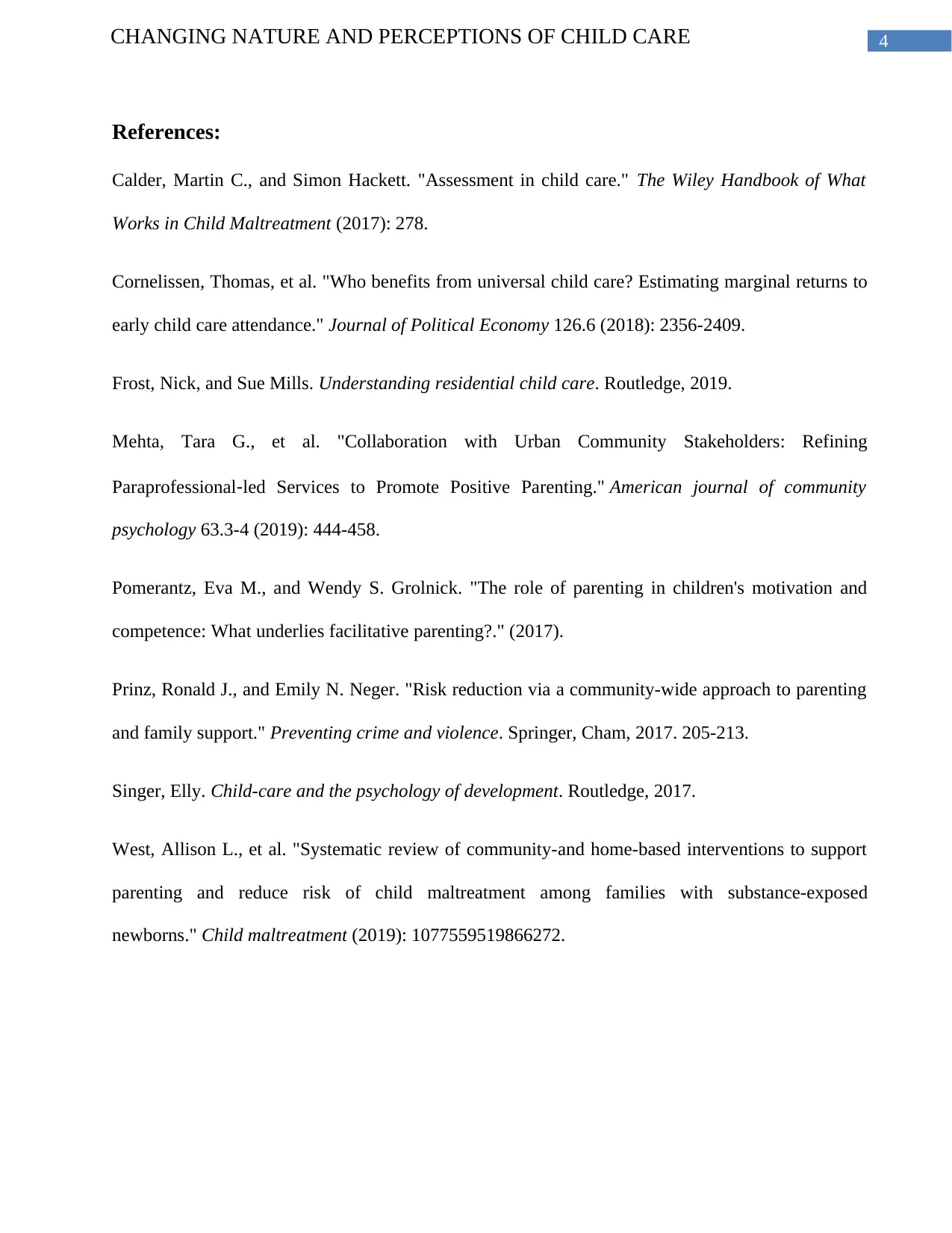
4CHANGING NATURE AND PERCEPTIONS OF CHILD CARE
References:
Calder, Martin C., and Simon Hackett. "Assessment in child care." The Wiley Handbook of What
Works in Child Maltreatment (2017): 278.
Cornelissen, Thomas, et al. "Who benefits from universal child care? Estimating marginal returns to
early child care attendance." Journal of Political Economy 126.6 (2018): 2356-2409.
Frost, Nick, and Sue Mills. Understanding residential child care. Routledge, 2019.
Mehta, Tara G., et al. "Collaboration with Urban Community Stakeholders: Refining
Paraprofessional‐led Services to Promote Positive Parenting." American journal of community
psychology 63.3-4 (2019): 444-458.
Pomerantz, Eva M., and Wendy S. Grolnick. "The role of parenting in children's motivation and
competence: What underlies facilitative parenting?." (2017).
Prinz, Ronald J., and Emily N. Neger. "Risk reduction via a community-wide approach to parenting
and family support." Preventing crime and violence. Springer, Cham, 2017. 205-213.
Singer, Elly. Child-care and the psychology of development. Routledge, 2017.
West, Allison L., et al. "Systematic review of community-and home-based interventions to support
parenting and reduce risk of child maltreatment among families with substance-exposed
newborns." Child maltreatment (2019): 1077559519866272.
References:
Calder, Martin C., and Simon Hackett. "Assessment in child care." The Wiley Handbook of What
Works in Child Maltreatment (2017): 278.
Cornelissen, Thomas, et al. "Who benefits from universal child care? Estimating marginal returns to
early child care attendance." Journal of Political Economy 126.6 (2018): 2356-2409.
Frost, Nick, and Sue Mills. Understanding residential child care. Routledge, 2019.
Mehta, Tara G., et al. "Collaboration with Urban Community Stakeholders: Refining
Paraprofessional‐led Services to Promote Positive Parenting." American journal of community
psychology 63.3-4 (2019): 444-458.
Pomerantz, Eva M., and Wendy S. Grolnick. "The role of parenting in children's motivation and
competence: What underlies facilitative parenting?." (2017).
Prinz, Ronald J., and Emily N. Neger. "Risk reduction via a community-wide approach to parenting
and family support." Preventing crime and violence. Springer, Cham, 2017. 205-213.
Singer, Elly. Child-care and the psychology of development. Routledge, 2017.
West, Allison L., et al. "Systematic review of community-and home-based interventions to support
parenting and reduce risk of child maltreatment among families with substance-exposed
newborns." Child maltreatment (2019): 1077559519866272.
1 out of 5
Related Documents
Your All-in-One AI-Powered Toolkit for Academic Success.
+13062052269
info@desklib.com
Available 24*7 on WhatsApp / Email
![[object Object]](/_next/static/media/star-bottom.7253800d.svg)
Unlock your academic potential
Copyright © 2020–2026 A2Z Services. All Rights Reserved. Developed and managed by ZUCOL.




